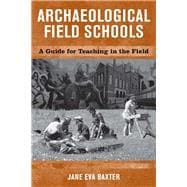
Note: Supplemental materials are not guaranteed with Rental or Used book purchases.
Purchase Benefits
What is included with this book?
| Acknowledgments | p. 9 |
| The Archaeological Institution of Field Schools | p. 11 |
| The Development of an Institution | p. 12 |
| How We Talk about Field Schools Today | p. 16 |
| About This Book | p. 18 |
| Field School Teaching: Pedagogy and Practice | p. 23 |
| Contemporary Climates: Teaching Archaeology and Field School Training | p. 25 |
| Cultural Resource Management Training | p. 26 |
| Working with the Public | p. 33 |
| The RPA and Field School Certification | p. 37 |
| Teaching as an Ethical Issue | p. 39 |
| Field Schools as Learning Communities | p. 40 |
| Lines of Convergence | p. 42 |
| Points of Contention | p. 43 |
| Pedagogical Concerns and Field School Development | p. 47 |
| Developing Teaching Goals | p. 48 |
| Translating Teaching Goals into Student Learning Outcomes | p. 51 |
| The Idea of Experiential Learning | p. 54 |
| Experiential Learning and Learning Communities | p. 60 |
| Assessing Learning in the Field | p. 61 |
| Structuring Experiential Learning in the Field | p. 65 |
| Abstract Conceptualization | p. 66 |
| Active Experimentation | p. 70 |
| Concrete Experience | p. 74 |
| Reflective Observation | p. 75 |
| Field School Logistics | p. 79 |
| Legal and Administrative Issues | p. 81 |
| Universities and Off-Site Programs | p. 82 |
| Site Agreements and Permissions | p. 83 |
| Health, Safety, and Liability | p. 87 |
| Liability Waivers | p. 90 |
| FERPA | p. 91 |
| Insurance | p. 93 |
| University Police or Public Safety Offices | p. 94 |
| Contracts and Providers | p. 94 |
| Connect on Your Campus | p. 96 |
| Personnel Issues | p. 97 |
| Defining Your Role as a Project Director and an Instructor | p. 97 |
| Staff and Organizational Structure | p. 101 |
| Graduate Student Supervisors | p. 102 |
| Professional Project Staff | p. 105 |
| Codirector or Go It Alone? | p. 106 |
| Health and Safety | p. 109 |
| Identifying Hazards at Your Site | p. 109 |
| Collecting Personal Information | p. 111 |
| Mitigating Risks for Students | p. 112 |
| Standards of Dress and Personal Appearance | p. 114 |
| Field Etiquette and Interpersonal Issues | p. 115 |
| Setting Standards of Behavior | p. 115 |
| Student-Generated Standards of Behavior | p. 118 |
| Working Together in the Field | p. 119 |
| Standards and Protocols for Public Interaction | p. 121 |
| Logistical Concerns | p. 125 |
| Before the Program Starts | p. 126 |
| Finding a Site | p. 126 |
| Getting Equipment Together | p. 133 |
| Recruiting Students | p. 139 |
| Logistics in the Field | p. 144 |
| Transportation | p. 144 |
| Food and Lodging | p. 145 |
| Field Facilities | p. 148 |
| Special Cases | p. 149 |
| International Field Schools | p. 149 |
| Commuter Field Schools | p. 153 |
| Balancing Teaching, Research, and Disciplinary Standards | p. 155 |
| Pressure Points | p. 156 |
| Maintaining Disciplinary Standards of Conduct | p. 156 |
| Field Schools as Annual "Money Makers" | p. 157 |
| Field Schools as the Only Research Outlets | p. 158 |
| Structural Suggestions for Those Seeking Balance | p. 159 |
| Working with Graduate Students and Undergraduates | p. 163 |
| Working with Graduate Students | p. 163 |
| Working with Undergraduate Students | p. 165 |
| Appendices | |
| RPA Guidelines and Standards for Archaeological Field Schools | p. 167 |
| Sample Safety Handout | p. 173 |
| A Summary of the Family Education Rights and Privacy Act (FERPA) | p. 177 |
| Sample Archaeological Field School Participant Information Form | p. 179 |
| Sample Handout of What Students Should and Should Not Bring to a Field School and Should Not Bring to a Field School on a Daily Basis | p. 181 |
| Sample Guideline Sheet for Students and the Media | p. 183 |
| References | p. 185 |
| Index | p. 191 |
| About the Author | p. 192 |
| Table of Contents provided by Ingram. All Rights Reserved. |
The New copy of this book will include any supplemental materials advertised. Please check the title of the book to determine if it should include any access cards, study guides, lab manuals, CDs, etc.
The Used, Rental and eBook copies of this book are not guaranteed to include any supplemental materials. Typically, only the book itself is included. This is true even if the title states it includes any access cards, study guides, lab manuals, CDs, etc.